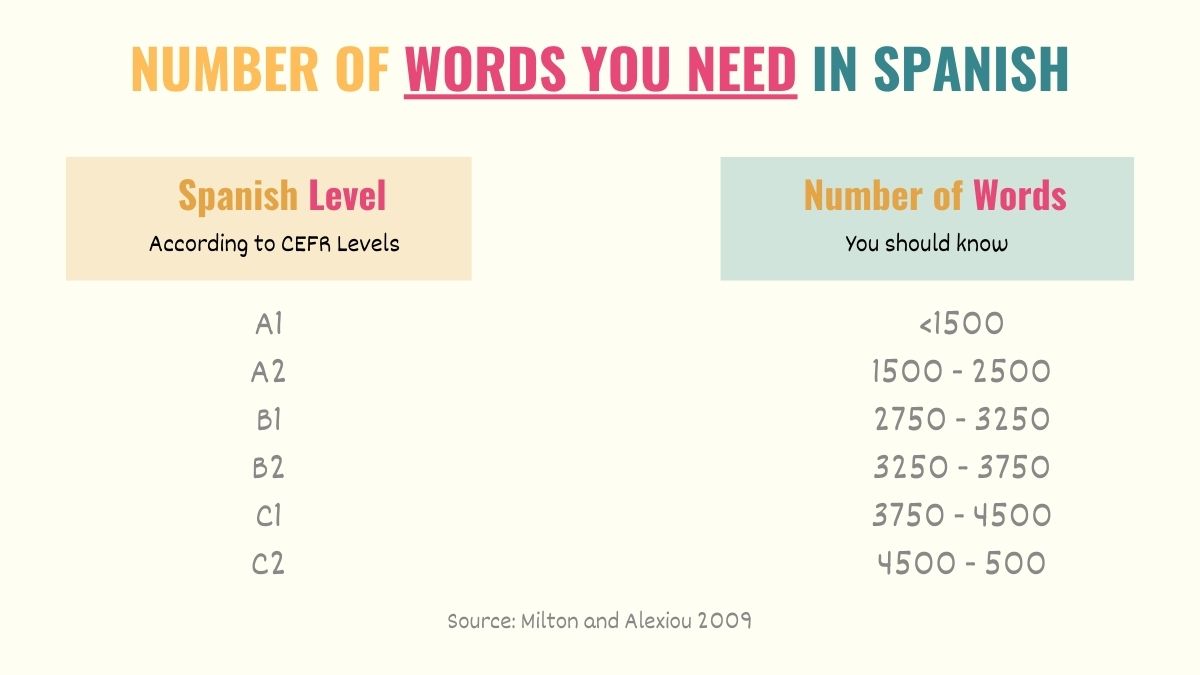Most Spanish learners invest a lot of time studying and memorizing all the words and expressions they can. What they should do is learn everyday Spanish vocabulary. Everyday vocabulary refers to the terms and phrases that Spanish speakers use to communicate daily.
In other words, everyday Spanish vocabulary is the type of vocabulary you should learn if you want to understand (and be understood) daily conversations. Seeing its importance, we’ll explore some key points about Spanish daily vocabulary in this guide. The topics we’ll cover are:
- Number of Words Used in Everyday Spanish
- Resources to Learn Everyday Vocabulary
- 6 Practical Tips to Improve Everyday Vocabulary
By the end of this, you’ll have a better idea of how to allocate your time and efforts in order to learn daily Spanish vocabulary.
Learning Spanish?
Join the Tell Me In Spanish community and get a copy of my step-by-step Spanish Learner’s Roadmaps and tricky synonyms & vocab cheat sheets.
How Many Words Are Used in Everyday Spanish?
According to El País, an average native Spanish speaker uses 1,000 words to communicate in different situations. This number increases to 5,000 for highly educated speakers. However, it is estimated that people only use 300 words to communicate in most daily life situations.
Even though Spanish is a very rich language, the number of words and expressions we use on a daily basis is very limited. For instance, you may think that 300 words is a small number to communicate in Spanish.
However, daily situations (such as doing groceries, going to the bank, going to work, talking to your neighbors, ordering food, and so on) are very repetitive. As a result, you’ll apply the same vocabulary with some minor variations to different situations. Check this:
Spanish at the bank:
Quiero hacer un depósito.
I want to make a deposit.
Spanish at a restaurant:
Quiero ordenar unos tacos.
I want to order tacos.
As you can imagine, the number of words people use in Spanish depends on their level of education and the situation in which they need to communicate. For example, the vocabulary you need as a tourist won’t be the same as if you were a college exchange student.
Based on the skills described by the Common European Framework of Reference for Languages, many linguists and language experts have established the vocabulary size Spanish learners need to know:

Regardless of what these numbers say, the key to learning useful vocabulary in Spanish is to identify the most common situations you’ll face and discover words that will help you communicate.
On a final note, if you learn the 300 most common words and start communicating on a daily basis, you can easily start learning as much additional vocabulary as you want because you’ve established such a strong base!
Spanish Resources to Learn Every Day Vocabulary
As mentioned before, everyday vocabulary will be helpful in pretty much any situation that you’ll encounter on an average day. So, now that you understand why everyday Spanish is so important for your communication, here are some resources to help you start developing your vocabulary.
Daily & Common Activities Vocabulary in Spanish
- 12 Expressions to Say Thank You in Spanish
- 15 Ways to Call a Guy Handsome in Spanish
- 100 Common Adjectives to Describe People
- Asking & Saying When Your Birthday Is
- Congratulating People in Spanish
- Days of the Week in Spanish
- Difference Between ‘Qué’ and ‘Cuál’
- Difference Between ‘Morning’ and Tomorrow in Spanish
- Difference Between ‘Tan’ and ‘Tanto’
- Different Ways to Say ‘Have a Good Day’ in Spanish
- Different Ways to Say ‘Hello’ in Spanish
- Guide to Colors in Spanish
- Guide to Describing the Weather in Spanish
- Guide to Months in Spanish
- Guide to Ordering Food in Spanish
- No Hay De Qué
- Ordering and Asking for Drinks in Spanish
- Que te Vaya Bien
- Vocabulary & Phrases for the Gym
- Vocabulary & Phrases to Get a Haircut
Vocabulary Expansion: Daily Vocabulary and Its Common Synonyms
- 3 Common Ways to Say ‘My Name Is’ in Spanish
- Expressions to Say Good Morning in Spanish
- 5 Expressions to Say I Don’t Understand in Spanish
- 7 Common Ways to Say ‘Happy Birthday’
- 7 Slang Terms to Say ‘Yes’
- 7 Popular Answers to ‘¿Cómo Estás?’
- 9 Popular Ways to Say ‘Grandma’ in Spanish
- 9 Ways to Say ‘Dude’ in Spanish
- 10 Common Ways to Say ‘Grandpa’
- 13 Common Ways to Say Goodbye
- ‘Acordarse’ vs. ‘Recordar’
- ‘Caliente’ vs ‘Calor’ in Spanish
- Canijo
- Chamaco
- Codo & Coda
- Common Ways to Say ‘My Love’ in Spanish
- Common Ways to Say Nice to Meet You
- Common Ways to Say ‘You’re Welcome’
- Cruda
- Different Ways to Say ‘Sister’ in Spanish
- Different Words to Say ‘Dad’ in Spanish
- ‘Enviar’ vs. ‘Mandar’
- Expressions to Say ‘No Problem’ in Spanish
- Mande
- ‘Me gustas’ vs. ‘Me Caes Bien’
- Muchacho & Muchacha
- Ojalá
- Popular Expressions to Say “I’m Hungry’
- Popular Ways to Say ‘Daughter’ in Spanish
- Popular Words to Say ‘Boy’ in Spanish
- Popular Words for ‘Son’ in Spanish
- Saying ‘Oh My God’ in Spanish
- Vale
- ‘Vamos’ vs. ‘Vámonos’
- ‘Volver’ vs. ‘Regresar’
Advanced Daily Vocabulary in Spanish
- 7 Ways to Say ‘Hurry Up’ in Spanish
- Common Spanish Idioms
- Dog Commands in Spanish
- Difference Between ‘Si’ and ‘Sí
- Encouraging Phrases to Cheer Someone
- Expressing Condolences in Spanish
- How to Address a Letter or Email
- Nicknames for ‘Mom’ in Spanish
- Popular Spanish Proverbs
- Using ‘Desde Hace’ in Spanish
- Using the Pronoun ‘Se’
- When to Use Formal vs Informal Spanish
How to Improve Everyday Spanish Vocabulary: 6 Practical Tips
As you can see, knowing everyday Spanish vocabulary will allow you to express yourself and understand what others are saying. Since it’s essential for you, here are some practical tips that you can use to learn or improve your daily Spanish vocabulary.
- Focus on the vocabulary you need. The type of Spanish you need depends on where you need to communicate. For daily Spanish, you should focus on learning vocabulary for everyday situations such as shopping, work or school, using public transportation, going to a restaurant, making small talk, ordering food, and other places you spend time on a daily basis.
- Watch TV in Spanish. Most TV shows are set in daily environments and have plots that you can relate to. Therefore, the vocabulary used in these TV shows or movies can be very useful for your conversations.
- Use flashcards. When learning a new word or expression that you think can be useful, you should create a flashcard with the term and an example of how to use it. That way, you can start creating a vocabulary base that you can consult whenever you need it.
- Read in Spanish. Reading is one of the best ways to acquire new vocabulary. To make the most out of this activity, you should start with short articles and books. As you begin developing your reading skills, you can try to read more challenging literature.
- Learn opposite words. An easy way to increase your Spanish daily vocabulary is to learn the antonym of every word you learn. This is because if you use one word, you’re likely to use its opposite at some point.
- Set your phone to Spanish. Even though it seems like a simple activity, setting your phone in Spanish can help you learn basic tech vocabulary, which you’ll be able to use in similar contexts.



